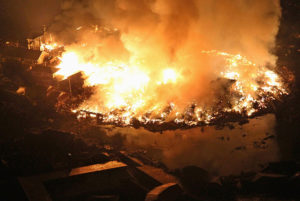The harsh reality is that BP and the rest of the oil companies drill for oil because we are willing and able to pay for it. There is no supply without demand. And Americans, who produce only 2 or 3 percent of the world’s oil but consume over 20% of it, have been the demanders in chief.
It will do absolutely no good to boycott BP if you keep buying oil and gas from someone else. BP’s oil, along with everyone else’s, is sold on the world market, not just to BP stations. Local gas stations are usually owned by entrepreneurs in your community, not by BP. They sell gas that comes from a variety of sources, not just their namesake. So as a consumer, even if you boycott a BP station, you’re not necessarily boycotting gas produced by BP. Likewise, if you buy gas from a different station, you could be buying BP gas.
Plus: is there any “good” gas? Are there any “good” oil companies? Is Exxon, responsible for what was previously the largest oil spill in U.S. history, better than BP? What about Shell, a company known for its horrid human rights violations? Or Chevron, which has been sued for polluting pristine rainforest in Ecuador?
Take a look at the photo (above, left) from AP photographer Charlie Riedel. It’s a bird, but that’s about all we can tell, it’s been so mired in oil.
Sadly, it’s a perfect metaphor for our economy.
Want to change it?












13 thoughts on “Mad at BP? Skip the Boycott. Stop Driving.”
Excellent point: let’s not allow the issue to be framed as “BP made a mistake, fix it and move on.” The issue is that corporations have no sense of responsibility for the environment.
Or for us.
Those who believe the Arctic National Wildlife Refuge is a safe alternative to offshore oil drilling have obviously not been paying attention to the BP oil spill. This recent disaster is a warning. A very big, messy and sad warning. We watch each day as oil washes up onto the shores of our nation’s Gulf Coast national wildlife refuges, leaving destruction in its wake. Our response must be to protect our nation’s largest and wildest national wildlife refuge instead of also allowing it to be washed in oil. Millions of birds begin their lives each year on the Coastal Plain of the Arctic Refuge, many of which journey to and beyond the Gulf Coast. As we watch bird after bird wash ashore covered in oil in the Gulf, we must do what we can to protect those that remain. Ensuring that one of our nation’s most critical bird habitats is kept out of the oil industry’s hands is an important step. Now is the time to put our voices out there and say “No, it is not okay to destroy another ocean, it is not okay to destroy more wildlife, it is not okay to allow all our precious gifts to be tainted by greed.”
For those of you who are still undecided about the Arctic drilling issue, I would like to share with you some facts. Facts which demonstrate why there is an urgent need to keep onshore drilling out of our Arctic Refuge:
1. As years of drilling in neighboring Prudhoe Bay have shown us, onshore drilling is not a safe, risk-free alternative.
• The Prudhoe Bay oil fields and Trans-Alaska Pipeline have caused an average of 435 spills annually on the North Slope since 1996, according to the Alaska Department of Environmental Conservation (ADEC).
• In 2006, BP’s corrosion problems at Prudhoe Bay caused the largest oil spill in North Slope history. Worse yet, BP couldn’t guarantee that corrosion in their negligently managed oil field would not cause further environmental devastation. BP was subsequently fined for criminal negligence.
• The negative effects of oil development extend well beyond the immediate “footprint” of development, according to the National Academy of Sciences. The oil field industrial sprawl on the North Slope, including drill sites, airports, roads, and gravel mines, has a direct “footprint” of 15,000 acres, but it actually spreads across an area of more than 640,000 acres, or 1,000 square miles, according to the Academy.
• The Arctic Refuge is the only place on Alaska’s North Slope that is legislatively closed to development.
2. The amount of oil speculated to be found in the Arctic Refuge will not even begin to meet our nation’s energy needs. Conservation, on the other hand, will deliver far more gains without destroying one of our nation’s last wild places.
• Currently the U.S. consumes nearly 20 million barrels a day, which means that Arctic Refuge oil production would be a mere drop in the bucket.
• A 2008 study by the federal government’s Energy Information Administration estimates that, between now and 2030, the coastal plain of the Arctic Refuge would produce a total of 2.5 billion barrels, or an average of less than 600,000 barrels of oil per day. Peak production would average 780,000 barrels per day, and last just two to three years.
• In comparison, conservation efforts have already delivered 17 barrels of oil savings for every barrel of oil that might be produced from the Arctic Refuge, according to the latest government data.
3. Drilling in the Arctic Refuge would not only destroy an ecologically-vital wilderness icon, but it would threaten the culture and livelihood of the people of the Gwich’in Nation who regard the Arctic Refuge’s Coastal Plain as the “sacred place where life begins.”
• The Arctic is alive, and it’s all around us. It is the birthing ground for numerous mammals including polar bears and the Porcupine Caribou Herd. Birds we see in our own backyards in all 50 states and across six continents begin their lives on the Coastal Plain of the Arctic National Wildlife Refuge.
• The Arctic Refuge represents our nation’s finest example of intact, naturally functioning Arctic and subarctic ecosystems. Such a broad spectrum of diverse habitats occurring within a single protected unit is unparalleled in North America.
• The Arctic Refuge is a place that must be protected into the future as it has been through the ages – as a wilderness for our children to experience and pass on to future generations.
You see? This is a decision that will impact generations to come. We cannot allow the permanent destruction of such a precious place for minimal profit. Too many times we have allowed our greed for oil to influence our decisions and let us selfishly destroy places that were doing more good when they were left alone than when we stepped in and developed them. Nature needs balance and the continued over-use of our natural resources will have devastating consequences. It is time to break the cycle and the first step in the right direction is demanding the protection of the Arctic Refuge.
Don’t let the Arctic National Wildlife Refuge become another wasted resource.
So enlightening. It worries me enough that I bicycle everywhere. Let’s make our cities as well as rural areas more bike-friendly!
Hi! I just found your blog through Yahoo’s “New York Woman Shifts to Green, Saves More than $10,000” page! I really like your blog, because you’re very passionate about the world just like I am! I’m glad that I found someone who has/understands the passion for being green like me 🙂
Thanks for your posts!!!!
You’re absolutely right. Please share any ideas you have for using less oil.
You’re very welcome. I hope you’ll join the One in a Million campaign. We need everyone!!
I’m totally with you on more biking and less driving! I just got my bike tuned up and am ready to go – anyone else?
What a great comment. Thanks so much for clarifying what’s at stake with the Refuge and why it makes absolutely no sense to drill there.
Sadly, it’s a bird.
Thanks. Maybe the silver lining in this, if there is one, is that people won’t believe superficial claims companies make, and companies will actually take their role to run responsible industries seriously.
I agree with Judith Fogt. Its people like you who have the correct perspective on situations and clearly want to make a difference. I hope you as well as everyone knows that ones voice is tiny but the internet is huge. keep blogging!
Thanks for all your support! I am trying to remain hopeful that, together, we can make a difference.
[…] MacEachern from Big Green Purse says that instead of boycotting BP, we should just stop driving. She […]
Comments are closed.